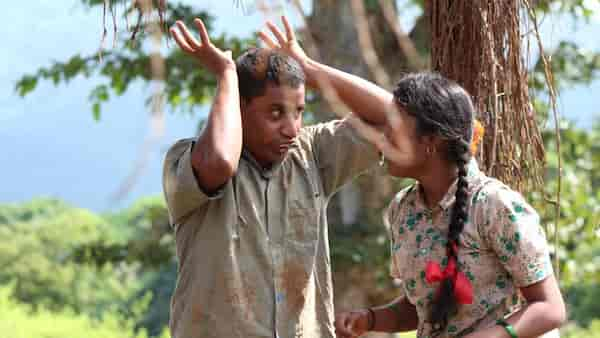Taledanda movie review: Late Sanchari Vijay’s socially-relevant film is, unfortunately, tiresome to watch
Released posthumously, the film has the late actor in a role inspired by a real-life character.

Last Updated: 01.53 PM, Apr 01, 2022
Story: Kunnegowda, an intellectually-challenged Soliga tribe member, grows up surrounded by greenery and with the abundant knowledge of the good that nature does, passed down by his father. When the local MLA devises a devious plan to have a road running way too close to the protected green belt that will result in 150 trees being chopped, Kunnegowda fights for their protection in his own innocent way. Can he get the better of unscrupulous politicians and drive home the point he’s been making all along?
Review: Taledanda is one of the late National Award-winning actor Sanchari Vijay last films. That’s also why I set out to see it, even though it is widely known that Taledanda is more art-house than entertaining fare. The film addresses pressing issues surrounding rampant deforestation for development, which in turn is causing global warming, rainfall depletion, among others. Nobel as this, it is the treatment of the narrative that is painfully slow and yawn-inducing.
The stand-out performers of Taledanda are, without doubt, Vijay and Mangala R, as Kethamma, Kunnegowda’s mother. Chaitra J Achar’s Saaki has limited screen space, but ensures she’s noticed even in her few scenes, especially those with Vijay. There was a lot of attention to detail to make her look like a member of the Soliga tribe, including the darkened skin tone and stained teeth, yet the makers overlooked her perfectly manicured fingers.
The beauty of Vijay’s performance as Kunnegowda, which is apparently modelled on a real-life character from Mysuru, is that he makes you forget him and only see the character. Here, with a set of false buckteeth, faltering speech impeded by his intellectual disability, and a limp, he embodies Kunnegowda and how. It is heart-breaking that we will not get to see how much more the actor would have challenged himself as an artiste, if he were still with us.
The dialogues, in the dialect of the Soliga tribe, were a tad difficult to follow, so, subtitles came in handy. Taledanda’s biggest drawback is its run-time. It takes too long to establish this tale, which is told mostly in flashback for the benefit of a bunch of doctors called in to establish Kunnegowda’s intellectual capacity, after an altercation with government officials overseeing the chopping of trees near his village.
Verdict: Taledanda is a festival circuit film and truth be told, it should have remained there. It is quite taxing for audiences to sit through over two and a half hours of the late Sanchari Vijay saying the same thing over and over again.

 Premium
Premium